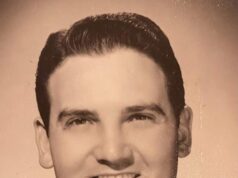BY FRANK X WALKER
I love Kentucky. I’m a proud graduate of UK. Much of my art is about identity, place, family, and social justice issues, so I hope you will allow me to add my two cents in the discussion surrounding a certain song, which for me has implications that deal specifically with identify, place, family, and social justice.
I’m from Title Town, KY. Of course when I lived there it was called Danville, but that was before both the county and the city schools won a total of six straight consecutive state football championships. Both are favored to repeat again this year. Believe it or not, I played football during my high school days. I started at free safety and flankerback on a team that produced perennial All-Stater Chris “The Bull” Jones, who went on to star at UK before an untimely knee injury.
We hated our cross-town rivals. Not because they were the lily-white Boyle County Rebels and their stands were full of Confederate flags and racial epithets, but because we learned on the football field during grueling three-a-day summer practices that they were the enemy.
I was crushed when 25 years after my graduation from good ol’ DHS, my sister enrolled her youngest son Maurice in the school I had learned to hate. Her oldest son, Marcus remained at my alma mater, Danville High. They both played football and yes, against each other. It was miniature version of the un-civil war all over again.
I rooted for both of my nephews, in the gym, on the field, and in the classroom, but I could never bring myself to sit in the Boyle County section at any of the games, until their basketball team made it to the Sweet 16 and our family purchased a whole row of seats. Boyle lost the game, Maurice gave a valiant effort, and I survived being surrounded by the “enemy.”
Before I became the self-appointed poet laureate of the projects I was a Race Man. As the first Director of UK’s Martin Luther King Jr. Cultural Center and the Assistant Director of Purdue University’s Black Cultural Center, I’ve studied informally with mentors and Race Men who’ve included Dr. William Parker, Chester Grundy, Dr. William Turner, and Dr. Gerald Smith. For every true Race Man, especially those born and bred in Kentucky, there are a handful of hot-button issues guaranteed to raise the temperature in any local barbershop. These issues include the following:
Lewis & Clark Expedition-York, the body servant of William Clark left Louisville, KY on October 26, 1803 as part of the official expedition, but didn’t receive any credit for the success of the journey, nor the triple pay, 300 plus acres of land, or his name listed on the official document at the conclusion of the journey.
Emancipation Proclamation-President Lincoln issued the Big E on January 1, 1863, declaring that slaves in all states and portions of states still at war with the federal government were free and would remain so. This unfortunately didn’t apply to slaves in Kentucky.
King in Kentucky-Dr. Martin Luther King Jr. actually spoke at the 1964 March on Frankfort. The rally brought more than 10,000 people together, including Jackie Robinson and Mahalia Jackson, in support of civil rights legislation.
Birth of a Nation-This controversial silent film, directed by Kentucky native David Griffith, has been credited with setting a standard for negative depictions of blacks on film and for reviving the modern version of the Ku Klux Klan.
UK Basketball-When an all-white Kentucky team lost to an all-black Texas Western team in the 1966 NCAA Championship dubbed “The Brown vs. Board of Education” game, black communities celebrated in the streets, a la Joe Louis victories of an earlier era.
Within several years all the teams in the Southeastern conferences had black players. Thirty years later, Rick Pitino’s willingness to put five black players on the floor at the same time and the hiring of Tubby Smith and Bernadette Locke as the only African American head coaching tandem in D1 basketball did much to remove some of the remaining anti-UK stigma in the black community.
Kentucky Derby-The Commonwealth’s most celebrated sporting event was dominated by black jockeys in its first two decades. The first was won by Oliver Lewis, an African American jockey aboard Aristides on May 17, 1875. William Walker won with Baden-Baden in 1877. Erskine Henderson , George Jarret Lewis, Babe Hurd, Issac Murphy, Isaac Lewis, Alonzo Clayton, James “Soup” Perkins, Willie Simms (in 1896 and 1898) and James Winkfield (who scored in 1901 and 1902).
My Old Kentucky Home-Written by Stephen Foster in 1853 and adopted as Kentucky’s state song in 1928 is just one of three state songs considered controversial because of its original lyrics.
Forgive me for dragging you kicking and screaming back in to your middle school Kentucky history class, but I believe facts are important, and many people make the mistake of participating in arguments and debates without the benefits of the facts. As important as I think the thumbnail sketch of the above historical moments are, I’d wager most of you didn’t learn about any of that in school.
And even with these facts, Ed Hamilton’s 8-foot bronze sculpture of York will over look the Ohio River in 2003, civil rights legislation passes, D.W. Griffith is still considered to be the innovative father of film grammar, UK basketball and Coach Rupp are legends, the Kentucky Derby is the most exciting and most watched two minutes in sports and somebody changed the original lyrics to “My Old Kentucky Home.”
But even though I get a little choked up on senior night when local TV cuts to a close up of the wildcat seniors, including the African Americans, with tears streaming down their faces, I know it’s not the song that’s making me misty eyed. And I know quite a few people would consider me ungrateful for being even slightly critical of an institution which awarded me an honorary degree, but I’m equally critical of another Lexington institution’s handling of its Jefferson Davis treasures and they awarded me an honorary doctorate too. I consider myself a part of both of these great schools so I believe that gives me the right to be critical of “us.”
In 1997 the Virginia senate voted to remove “Carry Me Back to Old Virginny” as its state song because of lyrical references to “darkeys” and “old massa.” Florida legislators tried but failed, to revoke state song status from Stephen Foster’s “Old Folks at Home,” also because of a lyrical reference to “darkeys.” In the original lyrics of Foster’s “My Old Kentucky Home” the second line is “‘Tis summer, the darkies are gay.” I don’t know of any organized attempt at revoking our state song nor do I know when “darkies” was replaced with “people” in what is now advertised as the words to our state song.
Clearly the most difficult thing to talk about in Kentucky is race. People’s capacity to talk around it continually amazes me. Many well-meaning people would like to pretend as if racism doesn’t exist and that the mere mention of it is unnecessarily bringing up the past. Yet the same people, almost in the same breath talk about the importance of tradition. Nobody can change the past, but I think it’s important that we learn from it.
It was only 30 years or so ago on UK’s campus when a certain fraternity would celebrate Old South weekend by parading around on campus on horseback dressed as Confederate soldiers. And prior to the annual Sharecroppers Ball they would parade down town to the courthouse and declare their secession from the university by replacing Old Glory with the Stars and Bars. Of course the ball continued its nostalgic notion of authenticity by featuring an all-black service staff and first-rate black entertainers. During this same era it has been noted that when UK played Ole Miss, it was impossible to tell which fans were which due to the number of Confederate flags being waved in the stands.
We’ve clearly come a long way since those days and the success of UK athletics in the post-Rupp era has clearly benefited from the participation of African American athletes, but this isn’t about sports, or race or tradition. It’s about a song, right? A song written in 1853, 10 years before the Emancipation Proclamation freed slaves in states in rebellion against the union, which we now know didn’t include Kentucky. It would be two more years before the 13th Amendment was ratified, thus freeing some of my very own relatives. In spite of the often falsely perpetuated “happy slave” image of our Bluegrass state, when Congress passed a militia act that allowed freed slaves and free blacks to join the Union army, this most certainly contributed to the record number of African American Kentuckians who enlisted with the Union. You can decide for yourself if one has anything to do with the other.
I honestly believe that it’s a recruiting disadvantage for an institution to not fully divest itself from all vestiges of racism. Even the Pope has apologized for the church’s role in slavery. I believe it’s an additional disadvantage to celebrate anything that can be misconstrued as insensitive to other people that the institution purports to want in its family. I don’t have any power, because I’m just a poet, but I wonder what would happen if African American athletes knew all of the facts and dared to question some of them. I’m not suggesting a boycott by any means, but I think if Jack Givens, Valerie Still, Sam Bowie, Jamal Mashburn, Derrick Anderson, Derrick Ramsey or any African American athlete at UK responsible for the banners that adorn the ceiling in Rupp Arena or the massive amounts of hardware in the trophy cases had objected en masse or signed a petition to replace the song, many of their most loyal/rabid fans, myself included, would eagerly add their name to the list.







